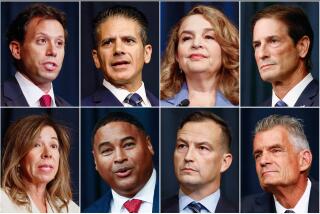Keeping Tabs on Tube Tactics
Taking principled positions on issues is an old tradition of American politics. So is a seamier tradition, what might politely be called character analysis. One of the gentler examples was a jingle that boys were paid to sing in neighborhoods during the presidential campaign of 1896:
“McKinley is a gentleman. Bryan is a bum.
McKinley drinks soda water. Bryan drinks rum.”
Setting out principled positions takes more time than many voters are willing to spare and, besides, they do not always play well on television, the medium that sets the tone for politics these days. As a result, the impression, good and bad, that candidates make on voters often depends on short, slick commercials that do not clutter a positive message with negative material--and vice versa.
But cramming a career that covers years into a commercial measured in seconds can be tricky business, as Times writer Keith Love reported Friday. In the current campaign for Democratic candidate for governor, for example, former San Francisco Mayor Dianne Feinstein has recently come from well behind Atty. Gen. John Van de Kamp in public-opinion polls and is now regarded as the campaign’s front-runner. Analysts attribute that largely to a commercial that dwelt entirely on her successes, with no failures to be found.
The attorney general’s campaign has now prepared a commercial to leave a much different impression. Love reports that Feinstein’s photograph is shown in the commercial alongside a headline reading: “Billion-Gallon Sewage Spill--S.F. Faces Fine.” Off camera, a voice declares that Feinstein was “cited for dumping a billion gallons of sewage in the bay.” What the commercial did not mention is that the spill involved an antiquated system that Feinstein inherited when she was elected, one she proceeded to modernize.
The Times plans to watch these so-called “killer” commercials from time to time from now on, adding where it can a bit of gray matter to the black and white of modern television politics.
More to Read
Get the L.A. Times Politics newsletter
Deeply reported insights into legislation, politics and policy from Sacramento, Washington and beyond. In your inbox three times per week.
You may occasionally receive promotional content from the Los Angeles Times.










